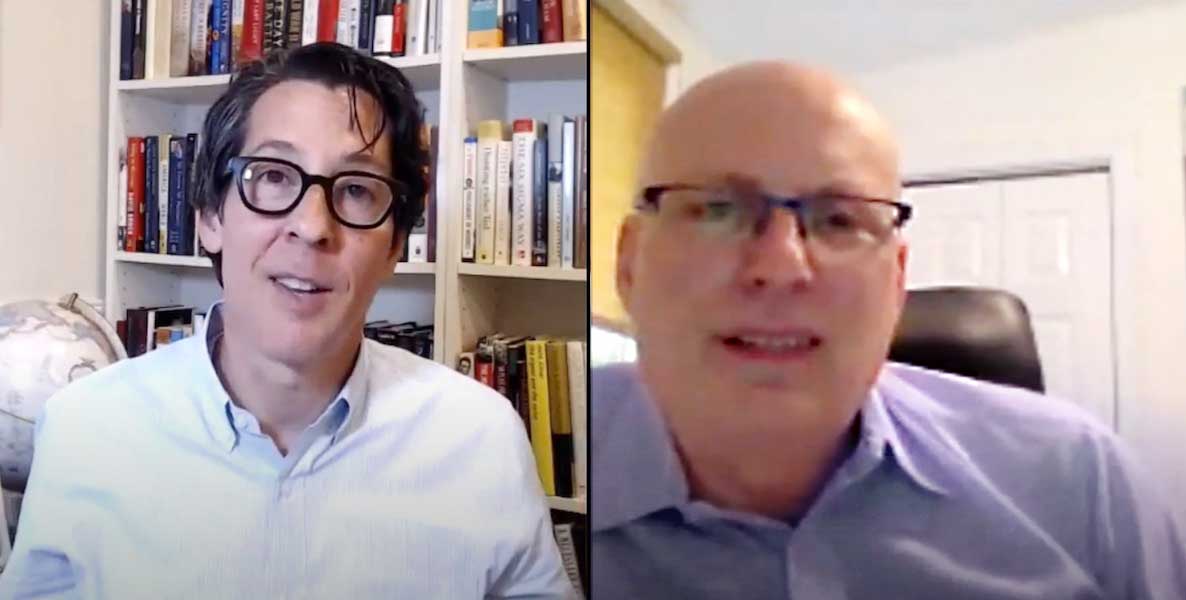![]() In case you missed it, the numbers don’t look good: Pennsylvania’s unemployment rate, at 13 percent, ranks us 47th out of the 50 states. Our entrepreneurship rate is 0.2 percent; our state’s Rainy Day Fund is enough to cover expenses for just one-third of a day—though the average nationwide is 26.8 days. These, too, are among the worst in the country.
In case you missed it, the numbers don’t look good: Pennsylvania’s unemployment rate, at 13 percent, ranks us 47th out of the 50 states. Our entrepreneurship rate is 0.2 percent; our state’s Rainy Day Fund is enough to cover expenses for just one-third of a day—though the average nationwide is 26.8 days. These, too, are among the worst in the country.
In fact, if you look at State Treasurer Joe Torsella’s new Fiscal Health Scorecard, a first-of-its-kind compilation of data about the economic state of the Commonwealth, what’s most disturbing is what Torsella says stood out to him when he reviewed the numbers: In nine of the 13 categories, Pennsylvania ranks at the bottom of the nation. In only one—Revenue Volatility, which indicates that the state relies on stable revenue streams—do we stand near the top of the heap.
As Torsella puts it: “That should be a flashing neon sign.”
The Fiscal Scorecard, released in late August, is the latest addition to Torsella’s Transparency Portal, a continuously updated look at the state’s finances. It is a simple, easy-to-follow glimpse into how Pennsylvania compares to other states, and what holds us back. (It is, by the way, an idea Philly government should steal.)
It is also sobering, given where we are now: In the midst of the biggest financial disaster since the Great Depression, having still not fully recovered from the 2008 recession.
“This is simply a distilled reflection of the finances of Pennsylvanians,” Torsella says. “Given the fault lines that Covid has revealed and made worse, and whatever economy we emerge with, I don’t think we can ignore our way out of this. We do have a chance to innovate our way out of this.”
“Look at some of the states out there that have done this, like Arkansas and Tennessee,” Torsella says. “If they can do it—for God’s sake, can’t we act like the sixth-largest state, that created all these wonders, and make it happen here too?”
To that end, Torsella a couple weeks ago also announced an even more compelling new idea than the Scorecard: The Pennsylvania Skills Compact, which would allow Pennsylvanians to get technical training or two-year associates degrees for free. The plan—which would need to be turned into a bill and then passed by the state legislature—would make Pennsylvania the 27th state in the country to provide free two-year college for its residents.
Under the Skills Compact as proposed by Torsella, any Pennsylvania resident, whether new high school grad or an adult of any age, would get help with filling out the FAFSA (Free Application for Federal Student Aid) in order to trigger a Pell Grant, tuition money available to students with great financial need. Any tuition not covered by federal grants would then be covered by the state.
His office estimates that would be about $1,700 a year per student, for up $82 million a year in total. That money, Torsella says, could come from sources other than the state’s General Fund. Arkansas, for example, uses federal re-training dollars to fund its iteration of this program, or it may be possible that some Covid-19 relief money could go towards free college tuition.
An Evolving Idea
![]() The Skills Compact is a continuation of a vision Torsella laid out four years ago, when he first ran for treasurer with the idea to launch what became Keystone Scholars. Under that program, the state seeds $100 in a 529 savings fund for every baby born in Pennsylvania. When they turn 18, that money is worth $500 that can be used towards college or other post-secondary training; the larger effect, though, is to jumpstart savings from families, so that number can help to cover the real costs of education.
The Skills Compact is a continuation of a vision Torsella laid out four years ago, when he first ran for treasurer with the idea to launch what became Keystone Scholars. Under that program, the state seeds $100 in a 529 savings fund for every baby born in Pennsylvania. When they turn 18, that money is worth $500 that can be used towards college or other post-secondary training; the larger effect, though, is to jumpstart savings from families, so that number can help to cover the real costs of education.
“We always saw Keystones as part of the answer, not the whole answer,” Torsella says now.
The announcement of the Skills Compact right now is notable for two reasons: First, Torsella is running for reelection in November, against Republican challenger Stacy Garrity. Second, Covid-19 has revealed not only the vast disparity in opportunities among Pennsylvania workers, but widened it.
Over 3 million Pennsylvanians have filed for unemployment benefits since March; many of them will never return to their jobs. Nationally, research out of University of Chicago estimates that 42 percent of pandemic-related layoffs could be permanent, a stat Torsella cites as likely the case here, as well.
Meanwhile, according to the Pennsylvania Chamber of Commerce, 22 percent of employers last year said a shortage of qualified workers was their biggest concern, an 8-percent leap over 2018. Some 60 percent of jobs around the country by 2025 will require post-secondary training of some sort, but only 50 percent of Pennsylvanians have a skills certification or higher. (That’s another stat in which we are below the national average of 51 percent.) And, we lead the nation in the amount of student debt owed by residents.
“Post-secondary education is not the guarantee of success,” Torsella says. “It is the price of entry. Without it, you’re almost guaranteed we’re going to leave you behind.”
Torsella has started talking to legislators about his plan, but doesn’t yet have anyone publicly committed to turning his idea into a bill. Designing legislation is an unusual role for a treasurer, but he points to his success with the Keystone Scholars program—which started as a pilot funded by philanthropic dollars—as an indicator that the Skills Compact, too, may find bipartisan support among electeds in the state capitol. (That bill was co-sponsored in the state Senate by Central Pennsylvania Republican John Gordner and Philadelphia Democrat Vincent Hughes.)
“Given the fault lines that Covid has revealed and made worse, and whatever economy we emerge with, I don’t think we can ignore our way out of this,” Torsella says. “We do have a chance to innovate our way out of this.”
Still, it may not be easy to convince politicians to authorize an $82 million annual expense in these economic times. That, Torsella says, would be shortsighted.
“If you’re telling me in a Commonwealth facing these issues, with a $34 billion budget, that we can’t find $82 million that results in a surge of first generation families and students of color getting these degrees—then something’s wrong with us,” he says. “Covid has revealed this is not a nice-to-do plan; it wasn’t something I could leisurely wait to do in my second term, if I have one. This is a matter of real urgency.”
How It Works in Other States
Torsella’s office worked with the country’s leading advocacy group on this issue, the Campaign for Free College Tuition, which has guided several states and municipalities in their efforts to form similar programs. In particular, both Torsella and Morley Winograd, president of the campaign, cite Tennessee Promise as the best—and also the first—example of a successful free college program.
 Tennessee Promise, launched in 2015, supplements Pell Grant funding for recent high school graduates going on to receive two-year degrees from community college. That program was modeled after Knoxville Achieves, funded by a local entrepreneur/philanthropist, Randy Boyd. (Knoxville Achieves was based, in turn, on the first of these programs, Kalamazoo Promise.) Knoxville’s mayor at the time, Bill Haslam, went on to become Tennessee’s governor, in 2011.
Tennessee Promise, launched in 2015, supplements Pell Grant funding for recent high school graduates going on to receive two-year degrees from community college. That program was modeled after Knoxville Achieves, funded by a local entrepreneur/philanthropist, Randy Boyd. (Knoxville Achieves was based, in turn, on the first of these programs, Kalamazoo Promise.) Knoxville’s mayor at the time, Bill Haslam, went on to become Tennessee’s governor, in 2011.
Haslam, a Republican, approached the issue of free college education from an economic development perspective, an approach that could appeal in Pennsylvania, as well. In the competition among southern states to get companies to relocate there, Haslam argued, he could offer not just lower-priced real estate and cost of living, but also a workforce with the particular skills and training needed to fill the jobs a company would bring to Tennessee.
Haslam hired Boyd, now the president of the University of Tennessee, to enact Tennessee Promise. As Boyd would say, according to Winograd: “Every state’s got cheap dirt. We have an advantage—the promise of smart people.”
Since then, 25 other states have enacted versions of a Promise or Skills Compact, including Tennessee’s neighbors and several with conservative elected officials who are not, as Winograd puts it, “in the forefront of offering benefits to residents”—West Virginia, Kentucky and Arkansas among them. New York, New Jersey, Delaware, Connecticut and Rhode Island also have free college programs.
Tennessee Promise has a couple of unique elements that have made it a success: All students agree to meet regularly with volunteer mentors, usually professionals in the community, who help them fill out the complicated FAFSA application to apply for a federal Pell Grant, and then help them navigate the world of college, something especially difficult for first-generation college-goers.
![]() With the help of mentors, the rate of application for Pell Grants in Tennessee now hovers above 70 percent, whereas most states struggle to get even 50 percent of high school grads to fill out FAFSAs—leaving tens of thousands of dollars in federal money on the table every year.
With the help of mentors, the rate of application for Pell Grants in Tennessee now hovers above 70 percent, whereas most states struggle to get even 50 percent of high school grads to fill out FAFSAs—leaving tens of thousands of dollars in federal money on the table every year.
And the state had the benefit of a $400 million surplus from its lottery, which it used to set up an endowment whose returns fund the program every year—so it does not cost the taxpayers.
In the first year after it launched, Tennessee saw a 24.7-percent increase in community college enrollment, and 20-percent increase in technical college enrollment. Since some of those students were expected to enroll in four-year colleges, the overall rate of increase for post-secondary education is around 10 percent—around 4,000 additional students.
In nine of the 13 fiscal health categories, Pennsylvania ranks at the bottom of the nation. In only one—Revenue Volatility, which indicates the state relies on stable revenue streams—do we stand near the top of the heap.
That increase was most prominent among Black students: The racial composition of Tennessee’s college population went from 14 percent African-American to 19 percent. The students took out 17 percent fewer loans, at an average of 12 percent lower amount.
And after a slow start, completion rates are also on the rise; in its second year, 16 percent more Promise students went back for their degree than those who were not part of the program. In Rhode Island, Winograd notes, the numbers are even more stark: College enrollment increased there by 47 percent.
Torsella’s plan is different from Tennessee’s in one big way: The Skills Compact would allow residents of any age to use the tuition funding, not just for a two-year associate’s degree, but for any certification program. This would allow recently laid-off workers to get free retraining for a different career. For that to be meaningful, the state would need to coordinate with employers like Comcast, for example, to ensure community colleges and technical schools are offering the training needed for the jobs that are available.
There’s no question that Pennsylvania needs something like the Skills Compact to jumpstart economic opportunities for Pennsylvanians. Winograd makes the case that there’s even more at stake than financial well-being.
A Common Underlying Mission
Winograd, who was former Vice President Al Gore’s senior policy advisor, co-founded the Campaign for Free College Tuition in 2014, after a year of talking with friends he calls his fellow “usedtobes”—lifelong public servants who at the age of 70 no longer had jobs that put them near power centers. Examining their lives in politics over a wide swath of candidates and causes, they found a common underlying mission: Making American democracy work better.
“We realized that economic mobility was essential for democracy to work,” Winograd says. “What’s the barrier to that mobility? College used to be free; now it’s unaffordable. It all happened in the same time period when having a degree or certification was essential to getting a job. There was just a total disconnect.”
Eventually, the Campaign aims to make four-year degrees free for Americans as well—though Winograd rues that he and his colleagues may not be alive for that. In the meantime, the momentum for fully-paid skills and associates degrees is growing.
Whether Torsella will get the chance to push his Skills Compact through the legislature depends in part on what happens in his November election, and on whether he can rally bipartisan support around an idea that in national politics is a pretty left-leaning idea—but that plays differently on a state level.
“Look at some of the states out there that have done this, like Arkansas and Tennessee,” Torsella says. “If they can do it—for God’s sake, can’t we act like the sixth-largest state, that created all these wonders, and make it happen here too?”
It’s election season in Philadelphia. Are you all set to vote?
- Check your voter registration in PA
- Register to vote in PA
- Find your polling place and other post-registration facts
- Request a mail-in ballots for the 2020 election
- Check out who’s running and what are the ballot questions








